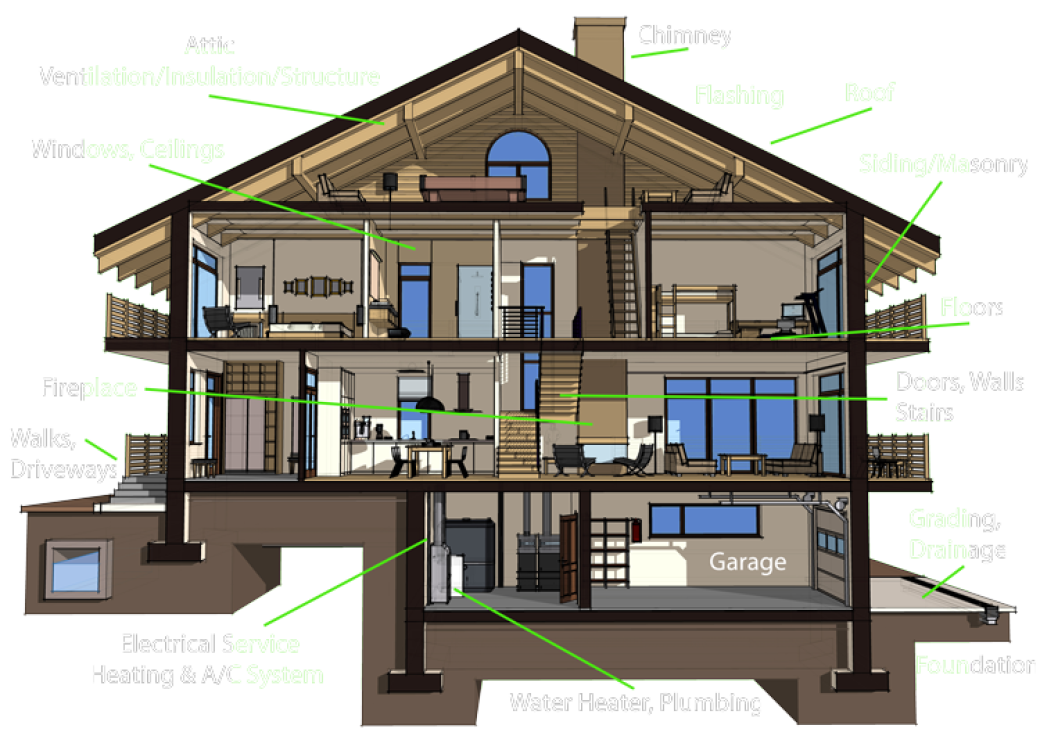Quality, Reliable, & Guaranteed
Home inspections you can trust
Our Services
Whether the house you’re buying (or selling) is big or small, new or over 100 years old, our home inspection services will help you understand it’s condition and how the systems operate.
-
Home Resale Inspections
-
New Construction Inspections
-
Home Phase Inspections
-
Residential Mold Inspections
-
FHA/VA Pest Inspections
-
Radon Testing
-
Well-Water & Septic Systems
-
Pools Inspections
-
Roof & Structural Inspections
-
Level 2 Chimney Inspections
-
Lawn Sprinkler System Inspections
-
Sewer Line Scope Inspections

What homebuyers need to know
Home Inspection Checklist
Include a home inspection contingency in your contract
Your first step is to make sure there’s a home inspection contingency—also referred to as a “due diligence” contingency—in your sales contract. This gives you a specified time period in which to have a professional inspection performed on the property.
Understand how your home inspection contingency works
In most cases, the inspection period is anywhere from one to two weeks from the date your sales contract is signed, though it depends on your specific agreement. The contingency period is supposed to give you enough time to:
- Find a good inspector
- Set up your appointment (and ideally attend it)
- Receive your inspection report
- Get any follow-up or additional inspections
- Decide how you’d like to move forward
Hire a qualified home inspector
Hiring a thorough, experienced home inspector is incredibly important. They should be current on certifications and up to date on all training and educational coursework. They also need a full insurance policy (this protects you if they're injured on your property) and should have deep experience in the area you’re buying in. This ensures they’re aware of any current problems with soil, pest and even home builders in your region.
Make sure your inspector follows this home inspection checklist
Every inspector does things a little differently, but there is a basic, standardized home inspection checklist they’re supposed to follow. Certain inspectors may go above and beyond this, or they may report their findings in a different way.
Read your home inspection report
Once your home inspector is done on your property, they’ll put together a full report of their findings. The report should have a section for each room or area of the house, as well as a note about anything that needs repairs, is damaged or isn’t functional.
Generally, you’ll see the following terms for any issues they spot:
- Material defect: An issue that might pose a potential safety hazard or have a significant impact on the home’s value.
- Major defect: A system or component that is not working, not functional and needs replacement or repair.
- Minor defect: A small issue that can usually be fixed by a contractor or the homeowner themselves.
- Cosmetic defect: A superficial flaw or blemish that doesn’t impact safety or functionality.
Get additional inspections
You should also use your report to gauge what other inspections might be necessary. If the inspector sees potential termite damage, you’ll want to get a termite inspection...if he notes mold on the report, you’ll want to have a mold inspector evaluate the property.
Decide what's important—and what's not
You’ll want to consider:
- Which issues pose a hazard to you and your loved ones?
- Which ones would cost a lot to repair?
- Which ones would prevent you from moving in on time?
- Which repairs can you handle on your own?
Make your decision
After you’ve reviewed your inspection reports and determined which issues are big and which aren’t so important, you’ll need to make a decision. Do you go through with the deal, renegotiate it or go back to the drawing board?
As long as you’re within your contingency period, you’ll have these options:
- Continue as planned, with the same sales prices and terms as you initially agreed to.
- Renegotiate the price with the seller or ask for credits toward your closing costs to cover the damages/repairs.
- Ask the seller to make certain repairs.
- Cancel your purchase contract outright and back out of the deal
Confirm any and all repairs have been completed
If you choose to have the seller make repairs to the home, you’ll need to make sure these are completed to your liking. Have your agent schedule a walk-through of the home once the repairs are made, so you can check in on the work and keep your closing on track.
In the event you had the seller make major repairs to the foundation, roof or other important features in the house, you might want to have your inspector come back out for what’s called a “reinspection.” These allow the original inspector to come back out and verify that issues have been properly resolved. They do come with a cost (though usually a small fraction of the original inspection price), but considering that they can prevent safety issues and future repairs down the road, they’re usually worth the normal investment.
Close on your home
Finally, after you’ve renegotiated and confirmed that the appropriate repairs were made (and made properly), you can move toward closing. As long as things go well with your lender, you should be able to sign your paperwork and get those keys, come closing day.